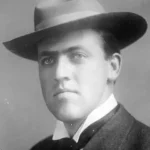 | |
The Cub Reporter | |
| Author | Rex Ellingwood Beach |
|---|---|
| Published |
1908
|
| Language | English |
| Nationality | American |
| Genre | Adventure, Romance |
1908 Short Story
The Cub Reporter
The Cub Reporter is an English Adventure, Romance short story by American writer Rex Ellingwood Beach. It was first published in 1908.
The Cub Reporter
by Rex Ellingwood Beach
Why he chose Buffalo Paul Anderson never knew, unless perhaps it had more newspapers than Bay City, Michigan, and because his ticket expired in the vicinity of Buffalo. For that matter, why he should have given up an easy job as the mate of a tugboat to enter the tortuous paths of journalism the young man did not know, and, lacking the introspective faculty, he did not stop to analyze his motives. So far as he could discover he had felt the call to higher endeavor, and just naturally had heeded it. Such things as practical experience and educational equipment were but empty words to him, for he was young and hopeful, and the world is kind at twenty-one.
He had hoped to enter his chosen field with some financial backing, and to that end, when the desire to try his hand at literature had struck him, he had bought an interest in a smoke-consumer which a fireman on another tugboat had patented. In partnership with the inventor he had installed one of the devices beneath a sawmill boiler as an experiment. Although the thing consumed smoke surprisingly well, it likewise unharnessed such an amazing army of heat-units that it melted the crown-sheet of the boiler; whereupon the sawmill men, being singularly coarse and unimaginative fellows, set upon the patentee and his partner with ash-rakes, draw-bars, and other ordinary, unpatented implements; a lumberjack beat hollowly upon their ribs with a peavy, and that night young Anderson sickened of smoke-consumers, harked anew to the call of journalism, and hiked, arriving in Buffalo with seven dollars and fifty cents to the good.
For seven dollars, counted out in advance, he chartered a furnished room for a week, the same carrying with it a meal at each end of the day, which left in Anderson’s possession a superfluity of fifty cents to be spent in any extravagance he might choose.
Next day he bought a copy of each newspaper and, carefully scanning them, selected the one upon which to bestow his reportorial gifts. This done, he weighed anchor and steamed through the town in search of the office. Walking in upon the city editor of The Intelligencer, he gazed with benevolent approval upon that busy gentleman’s broad back. He liked the place, the office suited him, and he decided to have his desk placed over by the window.
After a time the editor wheeled, displaying a young, smooth, fat face, out of which peered gray-blue eyes with pin-point pupils.
“Well?” he queried.
“Here I am,” said Anderson.
“So it appears. What do you want?”
“Work.”
“What kind?”
“Newspapering.”
“What can you do?”
“Anything.”
“Well, well!” cried the editor. “You don’t look much like a newspaper man.”
“I’m not one–yet. But I’m going to be.”
“Where have you worked?”
“Nowhere! You see, I’m really a playwright.”
The editor’s face showed a bit of interest. “Playwright, eh? Anderson! Anderson!” he mused. “Don’t recall the name.”
“No,” said Paul; “I’ve never written any plays yet, but I’m going to. That’s why I want to sort of begin here and get the hang of this writing game.”
A boy entered with some proofs at that moment and tossed them upon the table, distracting the attention of the newspaper man. The latter wheeled back to his work and spoke curtly over his shoulder.
“I’m not running a school of journalism. Good-by.”
“Maybe you’d like me to do a little space work–?”
“I’d never like you. Get out. I’m busy.”
Anderson retired gracefully, jingling his scanty handful of nickels and dimes, and a half-hour later thrust himself boldly in upon another editor, but with no better result. He made the rounds of all the offices; although invariably rebuffed he became more firmly convinced than ever that journalism was his designated sphere.
That night after dinner he retired to his room with the evening papers, wedged a chair against his bed, and, hoisting his feet upon the wash-stand, absorbed the news of the day. It was ineffably sweet and satisfying to be thus identified with the profession of letters, and it was immeasurably more dignified than “tugging” on the Saginaw River. Once he had schooled himself in the tricks of writing, he decided he would step to higher things than newspaper work, but for the present it was well to ground himself firmly in the rudiments of the craft.
In going through the papers he noted one topic which interested him, a “similar mystery” story on the second page. From what he could gather, he judged that much space had already been given to it; for now, inasmuch as no solution offered, the item was dying slowly, the major portion of each article being devoted to a rehash of similar unsolved mysteries.
Anderson read that the body of the golden-haired girl still lay at the Morgue, unidentified. Bit by bit he pieced together the lean story that she was a suicide and that both the police and the press had failed in their efforts to unearth the least particle of information regarding her. In spite of her remarkable beauty and certain unusual circumstances connected with her death investigation had led nowhere.
On the following day Anderson again walked into the editorial-rooms of The Intelligencer and greeted the smooth, fat-faced occupant thereof.
“Anything doing yet?” he inquired.
“Not yet,” said the newspaper man, with a trace of annoyance in his voice. As the applicant moved out he halted him at the door with the words: “Oh! Wait!”
Anderson’s heart leaped. After all, he thought, perseverance would–
“Not yet, nor soon.” The editor smiled broadly, and Paul realized that the humor in those pin-point eyes was rather cruel.
Five other calls he made that day, to be greeted gruffly in every instance except one. One man encouraged him slightly by saying:
“Come back next week; I may have an opening then.”
In view of the “pay-as-you-enter” policy in vogue at Anderson’s boarding-house he knew there could be no next week for him, therefore he inquired:
“How about a little space work in the meantime? I’m pretty good at that stuff.”
“You are?”
“Surest thing you know.”
“Did you ever do any?”
“No. But I’m good, just the same.”
“Huh!” the editor grunted. “There’s no room now, and, come to think of it, you needn’t bother to get around next week. I can’t break in new men.”
That evening young Anderson again repaired to his room with his harvest of daily papers, and again he read them thoroughly. He was by no means discouraged as yet, for his week had just begun–there were still five days of grace, and prime ministers have been made overnight, nations have fallen in five days. Six calls a day for five days, that meant thirty chances for a job. It was a cinch!
Hidden away among the back pages once more he encountered the golden-haired-girl story, and although one paper featured it a bit because of some imaginary clue, the others treated it casually, making public the information that the body still lay at the Morgue, a silent, irritating thing of mystery.
On the third day Paul made his usual round of calls. He made them more quickly now because he was recognized, and was practically thrown out of each editorial sanctum. His serenity remained unruffled, and his confidence undisturbed. Of all the six editors, Burns, of The Intelligencer, treated him worst, adding ridicule to his gruffness, a refinement of cruelty which annoyed the young steamboat man. Anderson clenched his hard-knuckled hand and estimated the distance from editorial ear to point of literary chin, but realized in time that steamboat methods were out of place here in the politer realms of journalism.
Four times more he followed his daily routine, and on Monday morning arose early to avoid his landlady. His week was up, his nickels and dimes were gone, nevertheless he spent the day on his customary rounds. He crept in late at night, blue with the cold and rather dazed at his bad luck; he had eaten nothing since the morning before, and he knew that he dared not show up at the breakfast-table the next morning. For the time being discouragement settled upon him; it settled suddenly like some heavy smothering thing; it robbed him of hope and redoubled his hunger. He awoke at daylight, roused by the sense of his defeat, then tiptoed out while yet the landlady was abed, and spent the day looking for work along the water-front. But winter had tied up the shipping, and he failed, as he likewise failed at sundry employment agencies where he offered himself in any capacity.
At noon he wandered into the park, and, finding a sheltered spot, sunned himself as best he could. He picked up the sheets of a wind-scattered paper and read until the chill December afternoon got into his bones and forced him to his feet. The tale of the unidentified girl at the Morgue recurred to him when he read the announcement that she would be buried two days later in the Potter’s Field. Perhaps the girl had starved for lack of work, he reflected. Perhaps hunger and cold had driven her to her death. Certainly those two were to blame for many a tragedy calculated to mystify warmly clad policemen and well-fed reporters.
When he stole, shivering, into his bleak bedroom, late that night, he found a note pinned upon his pillow. Of course the landlady needed her rent–all landladies were in need of money–and of course he would get out in the morning. He was glad she had not turned him out during the day, for this afforded him sanctuary for another night at least. After to-morrow it would be a park bench for his.
He left his valise behind in the morning, rather lamenting the fact that the old lady could not wear the shirts it contained, and hoping that she would realize a sufficient sum from their sale to pay his bill.
It was late afternoon when he commenced his listless tramp toward the newspaper offices. Since Burns had become his pet aversion, he saved him for the last, framing a few farewell remarks befitting the death of hopes like his, and rehearsing an exit speech suitable to mark his departure from the field of letters.
When he finally reached The Intelligencer editorial-rooms, Burns rounded on him angrily.
“For the love of Mike! Are you here again?” he demanded.
“I thought you might like to have some space work–“
“By heavens! You’re persistent.”
“Yes.”
“We editors are an unfeeling lot, aren’t we?” the fat young man inquired. “No temperament, no appreciation.” He laughed noiselessly.
“Give me a job,” Anderson cried, his voice breaking huskily. “I’ll make good. I’ll do anything.”
“How long do you intend to keep bothering me?” questioned Burns.
Anderson’s cheeks were blue and the backs of his legs were trembling from weakness, but he repeated, stolidly: “Give me a job. I–I won’t bother you after that. I’ll make good, see if I don’t.”
“You think well of yourself, don’t you?”
“If you thought half as well of me as I do,” Paul assured him, “I’d be your star reporter.”
“Star hell!” testily cried the editor. “We haven’t got such a thing. They don’t know they’re alive, except on pay-day. Look at this blond girl at the Morgue–they’ve wasted two weeks on that case.” He paused suddenly, then his soft lips spread, showing his sharp, white teeth. Modifying his tone, he continued: “Say, I rather like you, Anderson, you’re such a blamed nuisance. You’ve half convinced me that you’re a genius.”
The younger man’s hunger, which had given up in despair, raised its head and bit into his vitals sharply.
“Maybe I–“
“I’ve a notion to give you a chance.”
“That’s all I want,” the caller quavered, in a panic. “Just give me a toe-hold, that’s all,” His voice broke in spite of his effort to hold it steady. Burns wasn’t a bad sort, after all; just grouchy and irritable. Perhaps this was merely his way.
Burns continued: “Well, I will give you an assignment, a good assignment, too, and if you cover it I’ll put you on permanently. I’ll do more than that, I’ll pay you what we pay our best man, if you make good. That’s fair, isn’t it?”
He smiled benignly, and the soon-to-be reporter’s wits went capering off in a hysterical stampede. Anderson felt the desire to wring the fellow’s hand.
“All that counts in this office is efficiency,” the latter went on. “We play no favorites. When a man delivers the goods we boost him; when he fails we fire him. There’s no sentiment here, and I hold my job merely because I’m the best man in the shop. Can you go to work to-night?”
“Why–why–yes, sir!”
“Very well. That’s the spirit I like. You can take your time on the story, and you needn’t come back till you bring it.”
“Yes, sir.”
“Now pay attention, here it is. About two weeks ago a blond girl committed suicide in a Main Street boarding-house. The body’s down at the Morgue now. Find out who she is.” He turned back to his desk and began to work.
The hungry youth behind him experienced a sudden sinking at the stomach. All at once he became hopelessly empty and friendless, and he felt his knees urging him to sit down. He next became conscious that the shoulders of Mr. Burns were shaking a bit, as if he had encountered a piece of rare humor. After an instant, when Anderson made no move to go, the man at the desk wheeled about, exposing a bloated countenance purple with suppressed enjoyment.
“What’s the matter?” he giggled. “Don’t you want the job? I can’t tell you any more about the girl; that’s all we know. The rest is up to you. You’ll find out everything, won’t you? Please do, for your own sake and the sake of The Intelligencer. Yes, yes, I’m sure you will, because you’re a good newspaper man–you told me so yourself.” His appreciation of the jest threatened to strangle him.
“Mr. Burns,” began the other, “I–I’m up against it. I guess you don’t know it, but I’m hungry. I haven’t eaten for three days.”
At this the editor became positively apoplectic.
“Oh yes–yes, I do!” He nodded vigorously. “You show it in your face. That’s why I went out of my way to help you. He! He! He! Now you run along and get me the girl’s name and address while I finish this proof. Then come back and have supper with me at the Press Club.” Again he chortled and snickered, whereupon something sullen and fierce awoke in young Anderson. He knew of a way to get food and a bed and a place to work even if it would only last thirty days, for he judged Burns was the kind of man who would yell for the police in case of an assault. Paul would have welcomed the prospect of prison fare, but he reasoned that it would be an incomplete satisfaction merely to mash the pudgy face of Mr. Burns and hear him clamor. What he wanted at this moment was a job; Burns’s beating could hold over. This suicide case had baffled the pick of Buffalo’s trained reporters; it had foiled the best efforts of her police; nevertheless, this fat-paunched fellow had baited a starving man by offering him the assignment. It was impossible; it was a cruel joke, and yet–there might be a chance of success. Even while he was debating the point he heard himself say:
“Very well, Mr. Burns. If you want her name I’ll get it for you.”
He crammed his hat down over his ears and walked out, leaving the astonished editor gazing after him with open mouth.
Anderson’s first impulse had been merely to get out of Burns’s office, out of sight of that grinning satyr, and never to come back, but before he had reached the street he had decided that it was as well to starve striving as with folded hands. After all, the dead girl had a name.
Instead of leaving the building, he went to the files of the paper and, turning back, uncovered the original story, which he cut out with his pen-knife, folded up, and placed in his pocket. This done, he sought the lobby of a near-by hotel, found a seat near a radiator, and proceeded to read the clipping carefully.
It was a meager story, but it contained facts and was free from the confusion and distortions of the later accounts, which was precisely what he wished to guard against. Late one afternoon, so the story went, the girl had rented a room in a Main Street boarding-house, had eaten supper and retired. At eleven o’clock the next day, when she did not respond to a knock on her door, the room had been broken into and she had been found dead, with an empty morphine-bottle on the bureau. That was all. There were absolutely no clues to the girl’s identity, for the closest scrutiny failed to discover a mark on her clothing or any personal articles which could be traced. She had possessed no luggage, save a little hand-satchel or shopping-bag containing a few coins. One fact alone stood out in the whole affair. She had paid for her room with a two-dollar Canadian bill, but this faint clue had been followed with no result. No one knew the girl; she had walked out of nowhere and had disappeared into impenetrable mystery. Those were the facts in the case, and they were sufficiently limited to baffle the best efforts of Buffalo’s trained detective force.
It would seem that there can be no human creature so obscure as to have neither relatives, friends, nor acquaintances, and yet this appeared to be the case, for a full description of this girl had been blazoned in the papers of every large city, had been exposed in countless country post-offices, and conveyed to the police of every city of the States and Canada. It was as if the mysterious occupant of the Morgue had been born of the winter wind on that fateful evening two weeks before. The country had been dragged by a net of publicity, that marvelous, fine-meshed fabric from which no living man is small or shrewd enough to escape, and still the sad, white face at the Morgue continued to smile out from its halo of gold as if in gentle mockery.
For a long time Paul Anderson sat staring into the realms of speculation, his lips white with hunger, his cheeks hollow and feverish from the battle he had waged. His power of exclusion was strong, therefore he lost himself to his surroundings. Finally, however, he roused himself from his abstraction and realized the irony of this situation. He, the weakest, the most inexperienced of all the men who had tried, had been set to solve this mystery, and starvation was to be the fruit of his failure.
He saw that it had begun to snow outside. In the lobby it was warm and bright and vivid with jostling life; the music of a stringed orchestra somewhere back of him was calling well-dressed men and women in to dinner. All of them seemed happy, hopeful, purposeful. He noted, furthermore, that three days without food makes a man cold, even in a warm place, and light-headed, too. The north wind had bitten him cruelly as he crossed the street, and now as he peered out of the plate-glass windows the night seemed to hold other lurking horrors besides. His want was like a burden, and he shuddered weakly, hesitating to venture out where the wind could harry him. It was a great temptation to remain here where there was warmth and laughter and life; nevertheless, he rose and slunk shivering out into the darkness, then laid a course toward the Morgue.
While Anderson trod the snowy streets a slack-jowled editor sat at supper with some friends at the Press Club, eating and drinking heartily, as is the custom of newspaper men let down for a moment from the strain of their work. He had told a story, and his caustic way of telling it had amused his hearers, for each and every one of them remembered the shabby applicant for work, and all of them had wasted baffling hours on the mystery of this girl with the golden hair.
“I guess I put a crimp in him,” giggled Mr. Burns. “I gave him a chance to show those talents he recommends so highly.”
“The Morgue, on a night like this, is a pretty dismal place for a hungry man,” said one of the others. “It’s none too cheerful in the daytime.”
The others agreed, and Burns wabbled anew in his chair in appreciation of his humor.
Young Anderson had never seen a morgue, and to-night, owing to his condition, his dread of it was child-like. It seemed as if this particular charnel-house harbored some grisly thing which stood between him and food and warmth and hope; the nearer he drew to it the greater grew his dread. A discourteous man, shrunken as if from the chill of the place, was hunched up in front of a glowing stove. He greeted Anderson sourly:
“Out into that courtyard; turn to the left–second door,” he directed. “She’s in the third compartment.”
Anderson lacked courage to ask the fellow to come along, but stumbled out into a snow-filled areaway lighted by a swinging incandescent which danced to the swirling eddies.
Compartment! He supposed bodies were kept upon slabs or tables, or something like that. He had steeled himself to see rows of unspeakable sights, played upon by dripping water, but he found nothing of the sort.
The second door opened into a room which he discovered was colder than the night outside, evidently the result of artificial refrigeration. He was relieved to find the place utterly bare except for a sort of car or truck which ran around the room on a track beneath a row of square doors. These doors evidently opened into the compartments alluded to by the keeper.
Which compartment had the fellow said? Paul abruptly discovered that he was rattled, terribly rattled, and he turned back out of the place. He paused shortly, however, and took hold of himself.
“Now, now!” he said, aloud. “You’re a bum reporter, my boy.” An instant later he forced himself to jerk open the first door at his hand.
For what seemed a full minute he stared into the cavern, as if petrified, then he closed the door softly. Sweat had started from his every pore. Alone once more in the great room, he stood shivering. “God!” he muttered. This was newspaper training indeed.
He remembered now having read, several days before, about an Italian laborer who had been crushed by a falling column. To one unaccustomed to death in any form that object, head-on in the obscurity of the compartment, had been a trying sight. He began to wonder if it were really cold or stiflingly hot.
The boy ground his teeth and flung open the next door, slamming it hurriedly again to blot out what it exposed. Why didn’t they keep them covered? Why didn’t they show a card outside? Must he examine every grisly corpse upon the premises?
He stepped to the third door and wrenched it open. He knew the girl at once by her wealth of yellow hair and the beauty of her still, white face. There was no horror here, no ghastly sight to weaken a man’s muscles and sicken his stomach; only a tired girl asleep. Anderson felt a great pity as he wheeled the truck opposite the door and reverently drew out the slab on which the body lay. He gazed upon her intently for some time. She was not at all as he had pictured her, and yet there could be no mistake. He took the printed description from his pocket and reread it carefully, comparing it point by point. When he had finished he found that it was a composite word photograph, vaguely like and yet totally unlike the person it was intended to portray, and so lacking in character that no one knowing the original intimately would have been likely to recognize her from it.
So that was why no word had come in answer to all this newspaper publicity. After all, this case might not be so difficult as it had seemed; for the first time the dispirited youth felt a faint glow of encouragement. He began to formulate a plan.
Hurriedly he fumbled for his note-book, and there, in that house of death, with his paper propped against the wall, he wrote a two-hundred-word description; a description so photographically exact that to this day it is preserved in the Buffalo police archives as a perfect model.
He replaced the body in its resting-place and went out. There was no chill in him now, no stumbling nor weakness of any sort. He had found a starting-point, had uncovered what all those trained newspaper men had missed, and he felt that he had a chance to win.
Twenty minutes later Burns, who had just come in from supper, turned back from his desk with annoyance and challenge in his little, narrow eyes.
“Well?”
“I think I’ve got her, Mr. Burns.”
“Nonsense!”
“Anyhow, I’ve got a description that her father or her mother or her friends can recognize. The one you and the other papers printed disguised her so that nobody could tell who she was–it might have covered a hundred girls.”
Rapidly, and without noting the editor’s growing impatience, Paul read the two descriptions, then ran on, breathlessly:
“All we have to do is print ten or twenty thousand of these and mail them out with the morning edition–separate sheets, posters, you understand?–so they can be nailed up in every post-office within two hundred miles. Send some to the police of all the cities, and we’ll have a flash in twenty-four hours.”
Burns made no comment for a moment. Instead, he looked the young man over angrily from his eager face to his unblacked shoes. His silence, his stare, were eloquent.
“Why? Why not?” Anderson demanded, querulously. “I tell you this description isn’t right. It–it’s nothing like her, nothing at all.”
“Say! I thought I’d seen the last of you,” growled the corpulent man. “Aren’t you on to yourself yet?”
“Do you–mean that your talk this evening don’t go?” Paul demanded, quietly. “Do you mean to say you won’t even give me the chance you promised?”
“No! I don’t mean that. What I said goes, all right, but I told you to identify this girl. I didn’t agree to do it. What d’you think this paper is, anyhow? We want stories in this office. We don’t care who or what this girl is unless there’s a story in her. We’re not running a job-print shop nor a mail-order business to identify strayed females. Twenty thousand posters! Bah! And say–don’t you know that no two men can write similar descriptions of anybody or anything? What’s the difference whether her hair is burnished gold or ‘raw gold’ or her eyes bluish gray instead of grayish blue? Rats! Beat it!”
“But I tell you–“
“What’s her name? Where does she live? What killed her? That’s what I want to know. I’d look fine, wouldn’t I, circularizing a dead story? Wouldn’t that be a laugh on me? No, Mr. Anderson, author, artist, and playwright, I’m getting damned tired of being pestered by you, and you needn’t come back here until you bring the goods. Do I make myself plain?”
It was anger which cut short the younger man’s reply. On account of petty economy, for fear of ridicule, this editor refused to relieve some withered old woman, some bent and worried old man, who might be, who probably were, waiting, waiting, waiting in some out-of-the-way village. So Anderson reflected. Because there might not be a story in it this girl would go to the Potter’s Field and her people would never know. And yet, by Heaven, they would know! Something told him there was a story back of this girl’s death, and he swore to get it. With a mighty effort he swallowed his chagrin and, disregarding the insult to himself, replied:
“Very well. I’ve got you this time.”
“Humph!” Burns grunted, viciously.
“I don’t know how I’ll turn the trick, but I’ll turn it.” For the second time that evening he left the office with his jaws set stubbornly.
Paul Anderson walked straight to his boarding-house and bearded his landlady. “I’ve got a job,” said he.
“I’m very glad,” the lady told him, honestly enough. “I feared you were going to move out.”
“Yes!” he repeated. “I’ve got a job that carries the highest salary on the paper. You remember the yellow-haired girl who killed herself awhile ago?” he asked.
“Indeed I do. Everybody knows about that case.”
“Well, it got too tough for the police and the other reporters, so they turned it over to me. It’s a bully assignment, and my pay starts when I solve the mystery. Now I’m starved; I wish you’d rustle me some grub.”
“But, Mr. Anderson, you’re bill for this week? You know I get paid in–“
“Tut, tut! You know how newspapers are. They don’t pay in advance, and I can’t pay you until they pay me. You’ll probably have to wait until Saturday, for I’m a little out of practice on detective stuff. But I’ll have this thing cleared up by then. You don’t appreciate–you can’t appreciate–what a corking assignment it is.”
Anderson had a peculiarly engaging smile, and five minutes later he was wrecking the pantry of all the edibles his fellow-boarders had overlooked, the while his landlady told him her life’s history, wept over the memory of her departed husband, and confessed that she hoped to get out of the boarding-house business some time.
A good night’s sleep and a hearty breakfast put the young man in fine fettle, and about ten o’clock he repaired to a certain rooming-house on Main Street, the number of which he obtained from the clipping in his pocket.
A girl answered his ring, but at sight of him she shut the door hurriedly, explaining through the crack:
“Mrs. MacDougal is out and you can’t come in.”
“But I want to talk to you.”
“I’m not allowed to talk to reporters,” she declared. “Mrs. MacDougal won’t let me.”
A slight Scotch accent gave Anderson his cue. “MacDougal is a good Scotch name. I’m Scotch myself, and so are you.” He smiled his boarding-house smile, and the girl’s eyes twinkled back at him. “Didn’t she tell you I was coming?”
“Why, no, sir. Aren’t you a reporter?”
“I’ve been told that I’m not. I came to look at a room.”
“What room?” the girl asked, quickly. “We haven’t any vacant rooms.”
“That’s queer,” Anderson frowned. “I can’t be mistaken. I’m sure Mrs. MacDougal said there was one.”
The door opened slowly. “Maybe she meant the one on the second floor.”
“Precisely.” An instant later he was following his guide up-stairs.
Anderson recognized the room at a glance, from its description, but the girl did not mention the tragedy which had occurred therein, so he proceeded to talk terms with her, prolonging his stay as long as possible, meanwhile using his eyes to the best advantage. He invented an elaborate ancestry which he traced backward through the pages of Scottish Chiefs, the only book of the sort he had ever read, and by the time he was ready to leave the girl had thawed out considerably.
“I’ll take the room,” he told her, “and I’m well pleased to get it. I don’t see how such a good one stands vacant in this location.”
There was an instant’s pause, then his companion confessed: “There’s a reason. You’ll find it out sooner or later, so I may as well tell you. That’s where the yellow-haired girl you hear so much about killed herself. I hope it won’t make any difference to you, Mr.–“
“Gregor. Certainly not. I read about the case. Canadian, wasn’t she?”
“Oh yes! There’s no doubt of it. She paid her rent with a Canadian bill, and, besides, I noticed her accent. I didn’t tell the reporters, however, they’re such a fresh lot.”
Paul’s visit, it appeared, had served to establish one thing, at least, a thing which the trained investigators had not discovered. Canadian money in Buffalo was too common to excite comment, therefore none of them had seen fit to follow out that clue of the two-dollar bill.
“The papers had it that she was some wealthy girl,” the former speaker ran on, “but I know better.”
“Indeed? How do you know?”
“Her hands! They were good hands, and she used them as if she knew what they were made for.”
“Anything else?”
“No. She seemed very sad and didn’t say much. Of course I only saw her once.”
Anderson questioned the girl at some further length, but discovered nothing of moment, so he left, declaring that he would probably move into the room on the following day.
Prom the rooming-house he went directly to the Morgue, and for a second time examined the body, confining his attention particularly to the hands. The right one showed nothing upon which to found a theory, save that i







